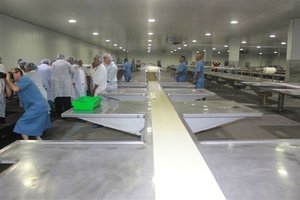Tri Marine International’s ten U.S. flag Cape fleet vessels and other U.S. flag boats based in American Samoa are once again allowed access to their historic fishing grounds in the Western and Central Pacific.
This comes after nearly two months of being locked out by failed treaty negotiations.
Don Binotto CEO of STP and the tuna Store says “This is welcome news not only for our fleet and our business, but to the many families in American Samoa that depend on a tuna-based economy, including the 2,000 employees we aim to have working when we are at capacity at Samoa Tuna Processors (STP).”
The Cape fleet fishes exclusively for Tri Marine.
During the treaty impasse, several of the vessels had to shift fishing operations to the Eastern Tropical Pacific – far from American Samoa where they are usually based.
All U.S. flagged tuna boats were tied up at the start of the year due to a disagreement with the tuna treaty that had surfaced in November 2015.
That month, the American Tunaboat Association informed the Pacific Island Parties (PIPs) that its members could not afford the $69 million price tag for 5,950 fishing days due to the rapidly declining value of tuna.
The cost to access the fish at that rate, ATA explained, didn’t make any sense as the value of the catch would not cover the cost of fishing.
Boats had to choose either to stay in port or to move to other fishing grounds.
The U.S. State Department subsequently notified the PIPs that the U.S. was only able to purchase 4,020 days for 2016.
On February 10, the Forum Fisheries Agency (FFA) responded to that proposal offering to sell 3,909 fishing days.
Tri Marine International says that within days, the ATA accepted the PIPs’ proposal and with a few details about the timing of payments still to be worked out, began telling its members to prepare their vessels to fish once again.
The company statement says while the ATA’s acceptance was relatively swift, it was not without concern from a number of vessel owners who worry they’ve already lost two months of fishing in 2016.
However, efforts are now focused on getting back to work and beginning the effort toward a longer-term solution for 2017 and beyond.
Tri Marine’s CEO, Renato Curto, says “Tri Marine stands by its long-term position that the current treaty model is obsolete,” .
He says “when island nations are dependent upon selling access rather than on the value of the resource itself for economic stability, the model cannot adequately withstand fluctuations in market conditions that characterize the industry.”
According to Curto, “What we really need is control on fishing capacity. That’s the best way to stabilize the market.”
Throughout the treaty impasse, Tri Marine has been sourcing tuna from more distant waters and relying on raw material reserves held in its cold storages to meet production requirements at STP.
“We are happy to see the tuna boats return to American Samoa from nearby waters,” Curto said, “but there’s still a lot of work to do if we are going to find a long-term solution makes sense for all parties.”




